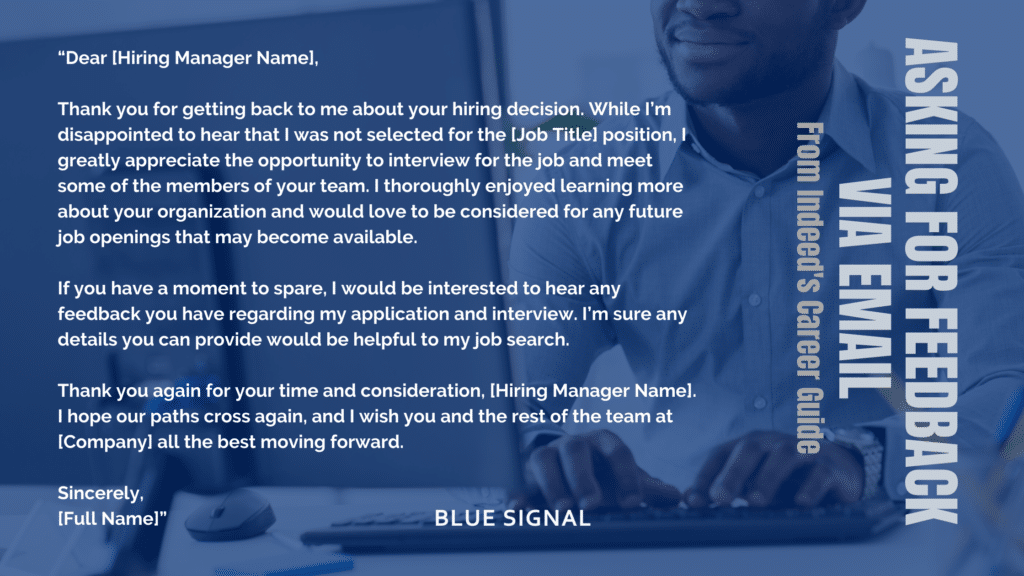Rejection is painful no matter how it happens. Getting rejected from a job is no different. Just like dating, it might have been due to a bad first impression or maybe they lost interest and ghosted. Whatever the case, bad interviews or disappearing interviewers, getting rejected from a job isn’t the end of the road.
Getting rejected from a job is nothing personal. Interviewers are just doing business! Regardless of the circumstance, rejection puts you in a great spot to learn. After being rejected from a job, you can always follow these 5 steps to ace that interview and land that next great job:
- Ask for Feedback
- Identify and Understand Why it was a Mismatch
- Leverage Your Support System
- Don’t Stop the Job Search
- Leverage External Resources
Asking for Feedback after Being Rejected
Unlike after a bad first date, asking for feedback is perfectly acceptable interview etiquette! It might be a sore subject, but it can really help you dial into things to change for your next interview. Indeed has a great template for how to respond to a job rejection email that you can leverage to ask for feedback.

While you may not have landed the job, following up and asking for feedback will show incredible levels of professionalism. Not to mention, the ability to learn and adapt are both excellent qualities in an applicant.
Better yet, the interviewer’s response can give you specific action items to address in the next steps of your job search journey. In the end, getting rejected could turn into your best tool for improvement!
Identify and Understand Why the Role May Have Been a Mismatch
Unfortunately, it’s commonplace for an interview to not live up to a candidate’s expectations. Job descriptions often don’t portray the intricacies of the role or the culture of the company. Perhaps this was your experience – the job looked good on paper, but when you were in the interview room you realized the job wasn’t what you thought it would be.
For example, lots of “marketing” jobs listed with marketer titles online are actually sales roles in practice. If your strong suit is in analytics and SEO, make sure that you don’t end up in an advertising sales interview by reading between the lines of the job posting to fully understand the role. They may have posted a “Marketing Specialist” title but listed requirements like negotiation skills and the ability to communicate clearly with end clients.
Be sure to refine your search to target jobs that are a better match when it comes to the functions of the role, not the job title. Then, prepare to speak to your qualifications as it pertains to those functions. You’re much more likely to succeed in an interview for a job you’re perfectly aligned for. And in the case where you end up in an ill-fit interview, getting rejected may end up saving you from a bad job!
Leverage Your Support System
Getting rejected can be a pretty sizable blow to anyone’s confidence. Restore it by practicing in a safe space! Reach out to trusted friends or colleagues to help you prepare for the next interview. Run through some mock interviews and have them ask you common interview questions. This usually includes staples like:
- What are your strengths and weaknesses?
- Where do you see yourself in five years?
- Why should we hire you over other applicants?
- What is your biggest accomplishment?
Better yet, review the questions you were asked in your last interview so you can be ready in case they come up again in the future. After each answer, discuss your responses together and get feedback on ways to optimize.
Most everyone has a bad interview story, so getting rejected from a job is very likely an experience you and your friends share. Ask them about their past interview experiences and try to learn from their own mistakes and triumphs. At the very least, share a good laugh about it!
Their input can be even more beneficial if they happen to work in your same industry or practice area. If they have experience as the interviewer themselves, ask them what they typically look for when assessing a candidate. What have they seen that you could try and replicate? What should you avoid? You may be surprised to hear what their indicators of success are!
Don’t Stop the Job Search – Turn Rejection Into Motivation
The worst thing you can do after being rejected from a job is stop trying. Keep applying for positions and the odds will be in your favor. It's a simple rule of numbers – the more roles you apply for, the more likely you are to receive an interview. Like the old saying goes, you can’t win if you don’t play.
While you’re applying, be sure to continually optimize your resume. Each application should have its own personalized resume that’s tailored to the role. Some jobs may put greater emphasis on certain skills than others, so display them accordingly before you hit submit. Over time, your resume should adapt to the needs of the market. For instance, if you’re in an interview and an interviewer asks you a question that’s not answered by your resume, make sure to add that info in for next time! You may be surprised to see what skills you omitted or past experiences you forgot to add that end up being applicable.
If time allows, take all the interviews you are offered. Jumping right back in after getting rejected may make the next interview daunting, but it’s good practice! Even if you aren’t 100% sold on the role, you may find that when the stakes are lower you’re able to ace it. Recreate that first impression environment and polish your strategies along the way. The best way to work through interview jitters is to acclimate!
Leverage External Resources
Just like dating, there are many fish in the sea when it comes to job opportunities too. Just because you missed one doesn’t mean the search is over! There are resources out there specifically designed for people in your situation. Resume and Career Services is a perfect place to start. They offer interview preparation tips, resume writing tips, and more in a subscription-based service that’s self-paced and sure to provide value to your career well past the interview stage.
Recruiters are a similar indispensable tool. If you’re able to work with a recruiter for a job opportunity, leverage their expertise when it comes to applications, interviews, salary negotiations, and career planning. Good recruiters will work to represent you and advocate for your best interests, all while coaching you through the job search process. Blue Signal works with clients to find perfect matches for their open positions. Apply to any of our jobs today to see if you’d be a good fit, and go from rejected to hired!

